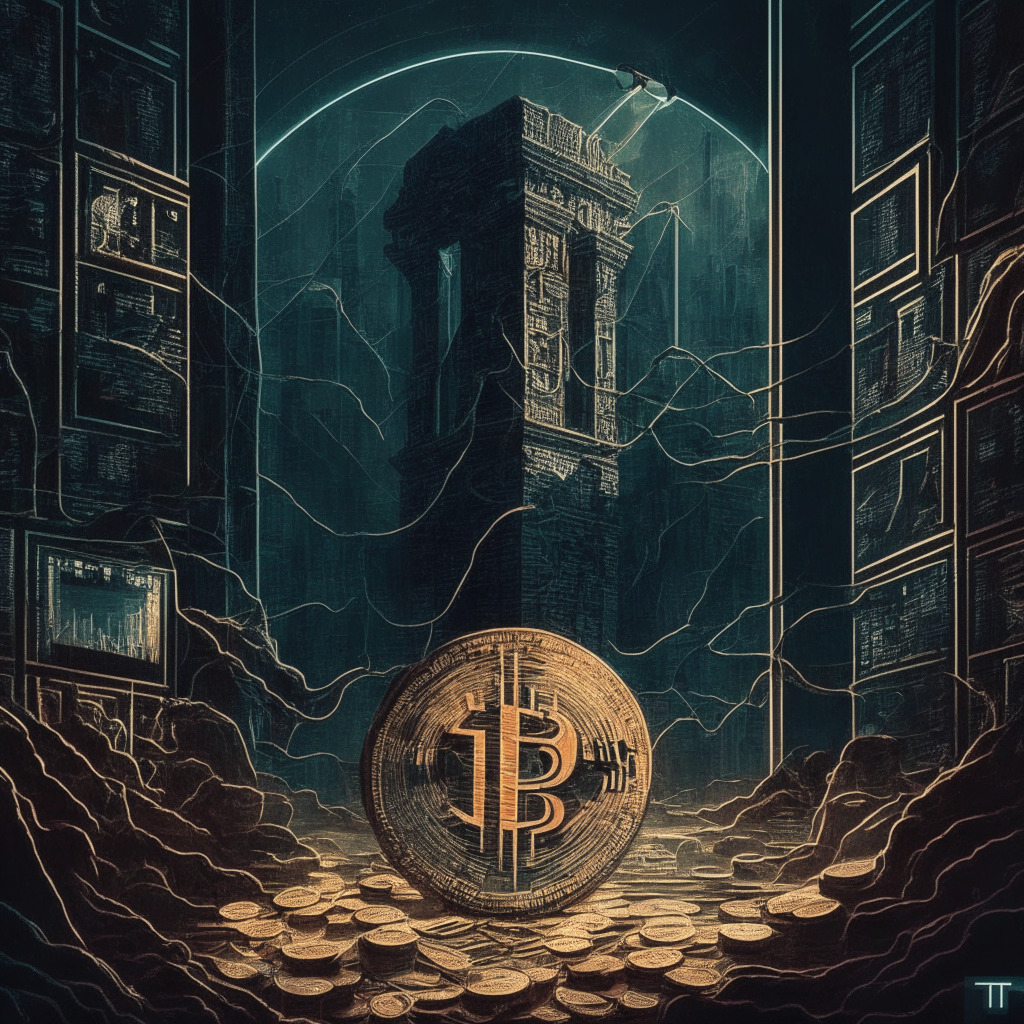“Affiliate groups of ISIS are increasingly utilizing cryptocurrency, specifically Tether stablecoins on the Tron network, suggests a report by TRM Labs. Regions such as Tajikistan, Indonesia, Pakistan, and Afghanistan are particularly active. This misuse of digital currencies underscores the importance of tracing blockchain donations and identifying donors to thwart pro-ISIS networks.”
Search Results for: U.S. Treasury
Challenging the CANSEE Act: Decentralized Finance in Regulatory Crosshairs
The recently introduced US Senate bill, Crypto-Asset National Security Enhancement Act (CANSEE), targets the DeFi sector with the aim of curbing money laundering. However, its ambiguous definition of ‘control’ over DeFi protocol and potential infringement on software developers’ rights have led to widespread disapproval.
15 Central Bank Digital Currencies by End of Decade: A New Era of Finance or Privacy Threat?
By the end of this decade, around 15 retail central bank digital currencies (CBDCs) could be globally available, covering nearly 95% of the world economy according to BIS. This emerging technology can offer significant benefits, but also brings challenges like privacy concerns.
Exploring the Potential for CBDCs to Disrupt Dollar Dominance in Global Trade
“Central bank digital currencies (CBDCs), inspired by Bitcoin protocol, have the potential to shift global economic dynamics. Adoption by countries like Brazil, UAE, Russia, Singapore, and China, accounting for one-fourth of global output, could stimulate de-dollarization, altering U.S. capital markets and geopolitical relations. CBDCs could enable direct international trade settlements, impacting the dollar’s hegemony.”
Navigating Crypto Market Stability Amidst Macro-Economic Factors and Unexpected Turns
“Macro-economic factors significantly impact the crypto industry’s future, with potential effects on inflation and interest rates. Despite challenges, Bitcoin has rallied back, trading 9.1% higher than its Anchored Volume Weighted Average Price (AVWAP). Macroeconomic developments and widespread banking collapses could potentially impact these gains, while high credit balances and potential recessions bring additional uncertainty.”
Rising Real Yields: A Threat or Opportunity to Cryptocurrencies and Tech Stocks?
“Despite rising inflation-adjusted yields on US government bonds sparking fears over potential backlash on stocks, crypto experts remain optimistic. They predict resilience in bitcoin and other digital assets, arguing that the increasing real borrowing cost could attract more investments into booming sectors like blockchain.”
Making Waves: Binance’s Battle to Change Crypto Compliance Perception
Binance, the world’s largest cryptocurrency exchange, is striving to break the perception of the crypto industry’s non-compliance. With a comprehensive compliance team including former law enforcement officers, regulators and crypto and banking experts, they actively combat potential financial crimes, monitor international regulatory developments and maintain customer due diligence. Despite facing legal challenges, Binance continues its rigorous compliance efforts.
Bitcoin’s July Boom: Expert Predictions Amid Market Fluctuations and ETF Approvals
Despite a recent 0.9% decline, experts like Markus Thielen, Head of Research for Matrixport, maintain an optimistic outlook for Bitcoin’s potential growth, especially given its historical July performance. Factors such as Bitcoin ETF approval expectations, options contract expirations, and institutional involvement are contributing to cautious optimism in the crypto market.
Bitcoin ETFs Reignite Interest: Institutional Boost or Crisis of Confidence in Crypto?
Bitcoin surpasses $30,000 as major firms like BlackRock, Invesco, and WisdomTree file for spot Bitcoin ETFs, boosting investor confidence despite regulatory uncertainty. Growing institutional interest suggests a new wave in crypto evolution, with the potential involvement of traditional financial institutions, pension funds, and university endowments.
SEC Crackdown on DeFi and Stablecoins: Analyzing Pros, Cons, and Market Implications
The SEC is potentially targeting decentralized finance (DeFi) and stablecoins, including Tether (USDT) and USD Coin (USDC), in its enforcement crackdown, according to a Berenberg report. Stablecoins, essential to the DeFi ecosystem, have raised national security concerns due to weak sanctions and money laundering controls. The SEC aims to weaken DeFi’s capacity to rival regulated exchanges and lenders.
Massive Crypto Heist Sparks Debate: Transparency vs Security in Blockchain Technology
Hackers targeted Atomic Wallet, stealing $35 million and using THORChain to launder their gains. Blockchain analysis firm MistTrack tracked the stolen funds, exposing the transparency of blockchain technology. Yet, concerns about digital asset security and decentralization misuse persist.
Bitcoin’s Rise Amid Dollar Decline: Pros and Cons of Market Shifts and Regulations
Bitcoin’s price experienced a 16% setback after reaching a high of $31,000, but remains up 60% YTD, driven by the dollar index decline and macroeconomic factors. Recent developments, such as BlackRock’s Bitcoin ETF application and potential altcoin regulation, create a complex debate surrounding the crypto market’s future.
Crypto Market Recovering Amid Regulatory Tensions: Binance vs SEC and CBDC Evaluations
The crypto market shows signs of recovery as the U.S. inflation rate cools and the Fed abstains from raising interest rates. Leading cryptocurrencies report nominal gains, while Binance faces legal battles with the SEC. Key events this week include discussions on central bank digital currencies and support for a draft bill to regulate cryptocurrencies, indicating that regulatory debates play a crucial role in shaping the future of the crypto market.
Tether’s Slight Depegging and AAVE’s Curve Freeze: Analyzing the Impact on Stablecoin Markets
Tether (USDT) experienced a slight depegging from its 1:1 ratio with the US dollar, coinciding with AAVE’s decision to freeze Curve (CRV) use as collateral for loans. This prompted whales and investors to capitalize on arbitrage opportunities, leading to Tether’s depegging at $0.996.
Tether Struggles to Maintain Dollar Peg: Impact on Stablecoin Confidence and Markets
Tether (USDT) recently fell below its dollar peg, trading at $0.996, raising concerns among stablecoin users. CTO Paolo Ardoino assured the company’s readiness to face challenges. However, skepticism surrounding Tether’s dollar-backing and decreased investor confidence emphasize the importance of maintaining stablecoin pegs to fiat currencies.
Bitcoin’s Struggle with $25K Resistance Amid Economic and Regulatory Uncertainty
Bitcoin’s narrow trading range has investors closely monitoring futures contract premiums and hedging costs, amid uncertainties regarding the Federal Reserve interest rate decision, US Treasury issuances, and the crypto regulatory environment. The recession risk for the U.S. economy further dampens demand for risk-on assets like Bitcoin.
Atomic Wallet Hack: $35M Laundered, Regulatory Woes, and Emerging Cyber Threats
The crypto world experienced a major security breach as attackers exploited Atomic Wallet and stole $35 million in tokens. As funds move via the OFAC-sanctioned exchange Garantex, the involvement of North Korean hacking group Lazarus is suspected. This incident highlights the challenges cryptocurrencies face for security and regulatory compliance.
Crypto Wash Trading Regulations: Balancing Tax Evasion Prevention and Innovation
Democrats push for tighter regulations on cryptocurrency wash trading to address tax evasion, as the IRS doesn’t currently treat cryptocurrencies as securities. Regulators aim to balance fostering innovation while protecting investors and the broader financial system from fraudulent activities.
Circle’s New Chief Legal Officer: A Path to Compliance or Regulatory Crackdown?
Stablecoin issuer Circle appoints Heath Tarbert as chief legal officer to tackle ongoing regulatory crackdown on cryptocurrencies. Tarbert’s expertise in highly-regulated industries aims to navigate complex regulatory landscapes, balancing innovation and compliance amidst increased scrutiny in the crypto industry.
Former CFTC Chair Joins Circle: Navigating Crypto Regulations and Shaping Future Guidelines
Circle Internet Financial hires Heath Tarbert, former CFTC chair, as chief legal officer to navigate complex regulatory challenges in the crypto industry. Tarbert’s global experience supports advancing USDC’s utility value, building relationships with governments, and establishing sound regulations for digital assets.
Raft’s stETH-Backed R Stablecoin: Innovation or Risky Experiment?
Raft’s new U.S. dollar stablecoin R, backed by Lido’s staked ether (stETH), introduces a unique offering in the crypto world. With a focus on avoiding inherent risks associated with fiat assets as collateral, Raft’s stablecoin aims to attract large players in the liquid staking ecosystem and withstand ongoing regulatory pressures.
Ethereum Staking Skyrockets: Impact of US Debt Ceiling and High APR on ETH Popularity
The record surge in Ethereum staking in May, reaching an all-time high of 2.96 million ETH, was attributed to factors such as the US debt ceiling saga, declining confidence in the U.S. dollar, banking crises, and high annual percentage rates (APR) offered on ETH staking.
Navigating Crypto Investments Amid US Debt Ceiling Crisis: Key Tokens to Watch
This article highlights the recent decline in Bitcoin and other leading cryptocurrencies, which coincides with the U.S. House of Representatives voting to suspend the national debt ceiling. Amid economic turbulence, cryptocurrencies such as WSM, IOTA, ECOTERRA, LTC, YPRED, XLM, and DLANCE emerge as noteworthy purchase considerations. The Wall Street Memes token ($WSM) presale is gaining attention and drawing investment.
MakerDAO Drops USDP: DeFi Stability Concerns & Avenues To Maximize Revenues
MakerDAO’s community vote unanimously decided to eliminate the $500 million USDP stablecoin from its reserves, impacting Paxos and raising concerns about the stability of some stablecoins within the crypto ecosystem. The decision aims to increase revenues and improve the protocol’s capital efficiency.
Cryptocurrencies, Fentanyl, and China: Balancing Regulation and Innovation
Senator Elizabeth Warren highlighted a connection between cryptocurrency payments and China-based firms supplying fentanyl precursors, raising concerns on the need for effective cryptocurrency regulations. Critics argue that imposing more regulations might hinder the growth and innovation of blockchain technology. Senator Warren plans to reintroduce legislation addressing the regulatory gaps related to illicit cryptocurrency use while safeguarding potential innovations in finance.
Cryptocurrency, Fentanyl Trade, and Balancing Regulation: An In-Depth Analysis
Senator Elizabeth Warren highlights the connection between cryptocurrency and the Chinese fentanyl trade, proposing the Digital Asset Anti-Money Laundering Act to halt such transactions. Striking a balance between security and innovation is crucial in regulating the blockchain and digital asset sector.
Debt Ceiling Deal Impact on Bitcoin: Crypto Market Reaction & Future Outlook
Bitcoin steadied after dropping below $28,000 due to progress on a debt ceiling deal, while government debt may prove favorable for the crypto market. Analysts suggest bitcoin’s resilience amid monetary tightening could be due to factors like store-of-value, NFTs, and supply/demand dynamics.
Tether Leverages Uruguay’s Renewable Energy for Bitcoin Mining: Eco-Friendly Progress or Not Enough?
Tether expands into Bitcoin mining in Uruguay, leveraging the country’s 94% renewable energy sources. While reducing ecological footprint, it also raises environmental concerns and emphasizes the importance of balancing innovation with ecological impact.
Tornado Cash Regains Control: Attack, Recovery, and Future of DeFi Security
Tornado Cash’s governance token holders regain control over the protocol after an unexpected proposal by the individual responsible for a recent attack. This highlights continuous challenges faced by decentralized finance (DeFi) protocols in maintaining security and safeguarding against potential vulnerabilities.
Debt Ceiling Deal Looms: Analyzing Its Impact on Cryptocurrency and Traditional Finance Markets
US President Joe Biden and Republican leader Kevin McCarthy are finalizing a deal to raise the $31.4 trillion debt ceiling, while core PCE inflation hits 4.7%, impacting interest rates and causing Bitcoin price drop. The debt ceiling deal and inflation data reveal the complex relationship between traditional finance and the cryptocurrency market.
Zero-Knowledge Compliance Tools: Balancing Privacy and Regulation in DeFi and Web3
Etonec partners with Mina Foundation to develop a zero-knowledge proof-powered regulatory compliance tool for the DeFi and Web3 markets. This solution will maintain user privacy while addressing KYC and AML regulations, potentially attracting more institutional investors and providing unprecedented data control for users.
Bearish Formation, Inflation Woes, and Regulatory Risks: Will Crypto Survive the Storm?
A bearish technical formation has caused a decline in total crypto market capitalization over seven weeks, with Bitcoin, BNB, and XRP experiencing drops. Sticky inflation and weak macroeconomic data, alongside regulatory risks, contribute to uncertainty and hinder bulls from regaining control.































